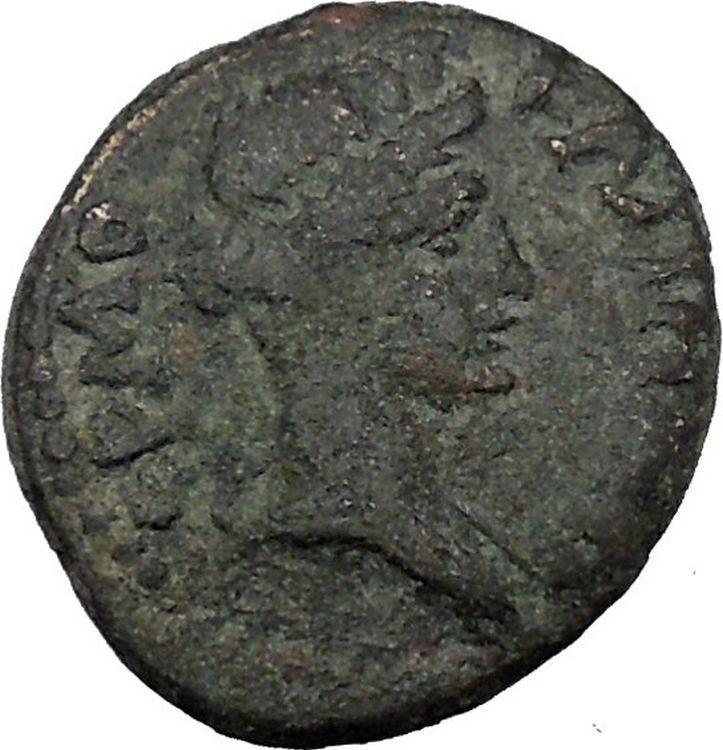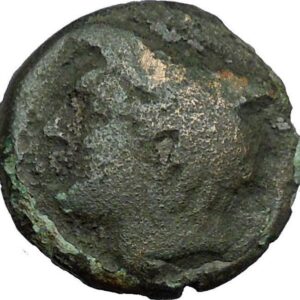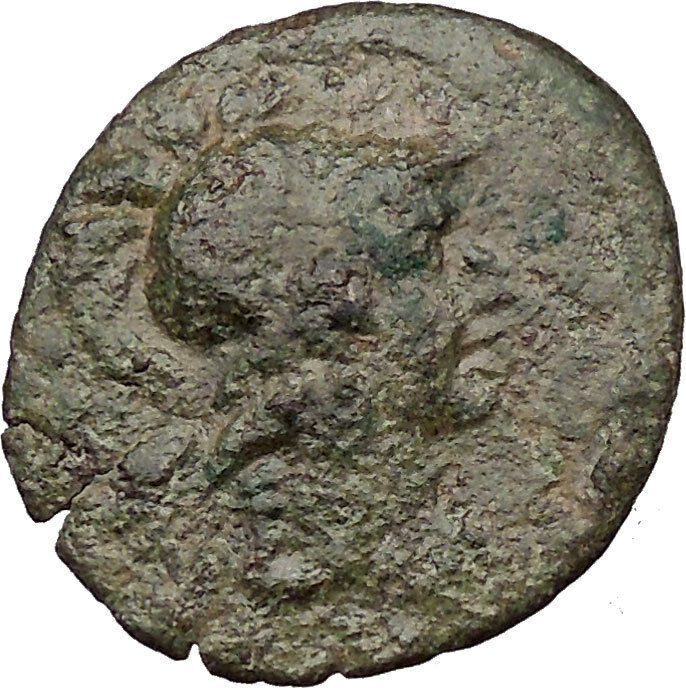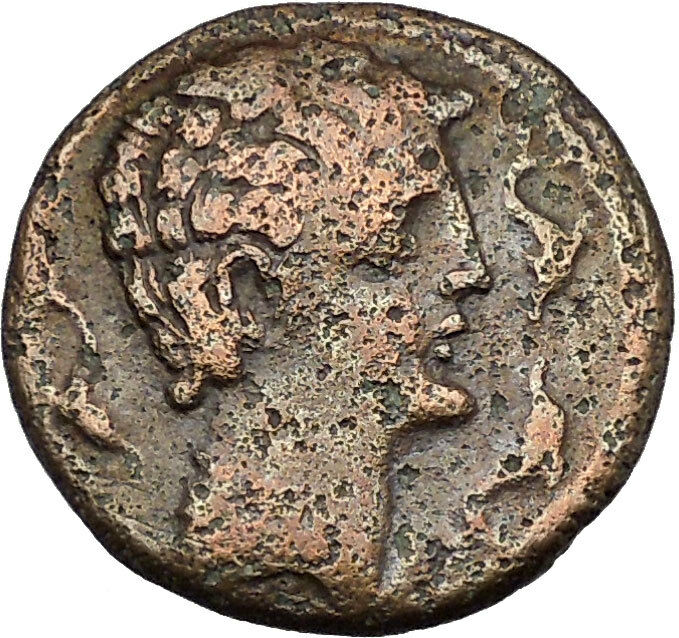|
Seleukid Kingdom
Achaios – King: 220-214 B.C. – Rebel Satrap in Asia Minor
Bronze 18mm (4.51 grams)
Sardes
or Uncertain mint, probably in Pisidia, circa 220-214 B.C.
Reference: HGC 9, 435 (R2-3); Sear 6963; SC 955, Ad 201 and Ad 202-203
Laureate head of
Apollo
right, hair in formal curls.
ΒΑΣΙΛΕΩΣ ΑXAIOY either side of
eagle
standing right,
palm branch over shoulder.
Uncle of Antiochos III, Achaios was appointed commander-in-chief in Asia Minor.
He restored Seleukid authority in the area but then rebelled against his young
nephew and proclaimed himself king. In 216 B.C. Antiochos moved against the
rebel, many of whose troops then deserted him. After a two-year siege of his
capital city of Sardeis, in Lydia, Achaios was captured and beheaded.
You are bidding on the exact
item pictured, provided with a Certificate of Authenticity and Lifetime
Guarantee of Authenticity.
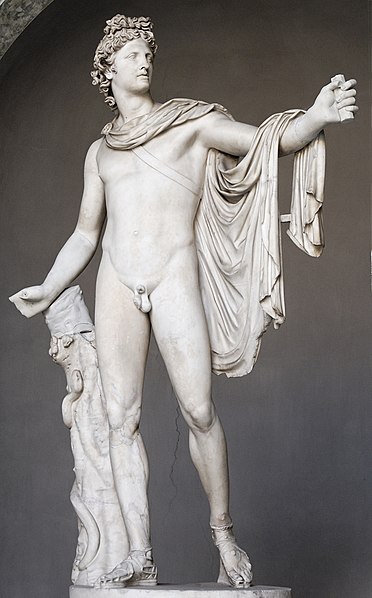
Apollo Belvedere
,
ca. 120–140 CE
Apollo is one of the most important and complex of the
Olympian deities
in
ancient Greek
and
Roman religion
,
Greek
and
Roman mythology
, and
Greco
–Roman
Neopaganism
. The ideal of the
kouros
(a beardless, athletic youth),
Apollo has been variously recognized as a god of light and the sun, truth and
prophecy, healing, plague, music, poetry, and more. Apollo is the son of
Zeus and Leto
, and has a twin sister, the chaste
huntress Artemis
. Apollo is known in Greek-influenced
Etruscan mythology
as Apulu.
As the patron of Delphi
(Pythian Apollo), Apollo was an
oracular
god—the prophetic deity of the
Delphic Oracle
. Medicine and healing are
associated with Apollo, whether through the god himself or mediated through his
son Asclepius
, yet Apollo was also seen as a god
who could bring ill-health and deadly
plague
. Amongst the god’s custodial charges,
Apollo became associated with dominion over
colonists
, and as the patron defender of herds
and flocks. As the leader of the
Muses (Apollon Musegetes) and director of their choir, Apollo
functioned as the patron god of music and poetry.
Hermes
created the
lyre for him, and the instrument became a common
attribute of Apollo
. Hymns sung to Apollo were
called paeans
.
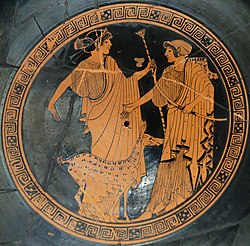
Apollo (left) and
Artemis
.
Brygos
(potter signed), Tondo of an
Attic red-figure cup c. 470 BC,
Musée du Louvre
.
In Hellenistic times, especially during the 3rd century BCE, as Apollo
Helios he became identified among Greeks with
Helios
,
Titan
god of the sun
, and his sister Artemis
similarly equated with
Selene
, Titan
goddess of the moon
In Latin texts, on the
other hand,
Joseph Fontenrose
declared himself unable to
find any conflation of Apollo with
Sol
among the
Augustan poets
of the 1st century, not even in
the conjurations of Aeneas
and
Latinus
in
Aeneid
XII (161–215). Apollo and Helios/Sol
remained separate beings in literary and mythological texts until the 3rd
century CE.
Origins

The Omphalos
in the Museum of
Delphi
.
The cult centers of Apollo in Greece,
Delphi
and
Delos
, date from the 8th century BCE. The Delos
sanctuary was primarily dedicated to
Artemis
, Apollo’s twin sister. At Delphi,
Apollo was venerated as the slayer of
Pytho
. For the Greeks, Apollo was all the Gods
in one and through the centuries he acquired different functions which could
originate from different gods. In
archaic Greece
he was the
prophet
, the oracular god who in older times
was connected with “healing”. In
classical Greece
he was the god of light and of
music, but in popular religion he had a strong function to keep away evil.
From his eastern-origin Apollo brought the art of inspection from “symbols
and omina
” (σημεία και τέρατα : semeia kai
terata), and of the observation of the
omens of the days. The inspiration oracular-cult was probably
introduced from Anatolia
. The
ritualism
belonged to Apollo from the
beginning. The Greeks created the
legalism
, the supervision of the orders of the
gods, and the demand for moderation and harmony. Apollo became the god of
shining youth, the protector of music, spiritual-life, moderation and
perceptible order. The improvement of the old
Anatolian
god, and his elevation to an
intellectual sphere, may be considered an achievement of the
Greek
people.
Healer and
god-protector from evil
The function of Apollo as a “healer” is connected with
Paean
, the physician of the Gods in the
Iliad
, who seems to come from a more
primitive religion. Paeοn is probably connected with the
Mycenean
Pa-ja-wo, but the etymology is the
only evidence. He did not have a separate cult, but he was the personification
of the holy magic-song sung by the magicians that was supposed to cure disease.
Later the Greeks knew the original meaning of the relevant song “paean”. The
magicians were also called “seer-doctors”, and they used an ecstatic prophetic
art which was used exactly by the god Apollo at the oracles.
In the Iliad, Apollo is the healer under the gods, but he is also the
bringer of disease and death with his arrows, similar to the function of the
terrible
Vedic
god of disease
Rudra
.He sends a terrible plague to the
Achaeans
. The god who sends a disease can also
prevent from it, therefore when it stops they make a purifying ceremony and
offer him an “hecatomb” to ward off evil. When the oath of his priest appeases,
they pray and with a song they call their own god, the beautiful Paean.
Some common epithets of Apollo as a healer are “paion” , “epikourios”,
“oulios”, and “loimios” . In classical times, his strong function in popular
religion was to keep away evil, and was therefore called “apotropaios” and
“alexikakos” , throw away the evil).
In later writers, the word, usually spelled “Paean”, becomes a
mere epithet of Apollo in his capacity as a god of
healing
.
Homer illustrated Paeon the god, and the song both of
apotropaic
thanksgiving or triumph. Such songs
were originally addressed to Apollo, and afterwards to other gods: to
Dionysus
, to Apollo
Helios
, to Apollo’s son
Asclepius
the healer. About the 4th century
BCE, the paean became merely a formula of adulation; its object was either to
implore protection against disease and misfortune, or to offer thanks after such
protection had been rendered. It was in this way that Apollo had become
recognised as the god of music. Apollo’s role as the slayer of the
Python
led to his association with battle and
victory; hence it became the
Roman
custom for a paean to be sung by an army
on the march and before entering into battle, when a fleet left the harbour, and
also after a victory had been won.
Oracular cult

Columns of the
Temple of Apollo
at Delphi, Greece.
Unusually among the Olympic deities, Apollo had two cult sites that had
widespread influence: Delos
and
Delphi
. In cult practice,
Delian Apollo
and
Pythian Apollo
(the Apollo of Delphi) were so
distinct that they might both have shrines in the same locality.Apollo’s
cult
was already fully established when written
sources commenced, about 650 BCE. Apollo became extremely important to the Greek
world as an oracular deity in the
archaic period
, and the frequency of
theophoric names
such as Apollodorus or
Apollonios and cities named Apollonia testify to his popularity.
Oracular sanctuaries to Apollo were established in other sites. In the 2nd and
3rd century CE, those at
Didyma
and
Clarus
pronounced the so-called “theological
oracles”, in which Apollo confirms that all deities are aspects or servants of
an
all-encompassing, highest deity
. “In the 3rd
century, Apollo fell silent.
Julian the Apostate
(359 – 61) tried to revive
the Delphic oracle, but failed
Seleucid
Empire
Σελεύκεια
Seleúkeia |

|
312 BC–63 BC |
↓
|
|
|
The Seleucid Empire in 301 BC.
|
The
Seleucid Empire was a
Hellenistic
state ruled by the Seleucid dynasty
founded by
Seleucus I Nicator
following the division of
the empire created by
Alexander the Great
. Seleucus received
Babylonia
and, from there, expanded his
dominions to include much of Alexander’s
near eastern
territories.
The Seleucid Empire was a major center of
Hellenistic
culture that maintained the
preeminence of
Greek
customs where a Greek-Macedonian
political elite dominated, mostly in the urban areas. The Greek population of
the cities who formed the dominant elite were reinforced by emigration from
Greece
. Seleucid expansion into
Anatolia
and Greece was abruptly halted after
decisive defeats
at the hands of the
Roman army
. Their attempts to defeat their old
enemy
Ptolemaic Egypt
were frustrated by Roman
demands. Much of the eastern part of the empire was conquered by the
Parthians
under
Mithridates I of Parthia
in the mid-2nd century
BC, yet the Seleucid kings continued to rule a
rump state
from
the Seleukid Kingdom
until the invasion by
Armenian
king
Tigranes the Great
and their ultimate overthrow
by the Roman
general
Pompey
.
|










